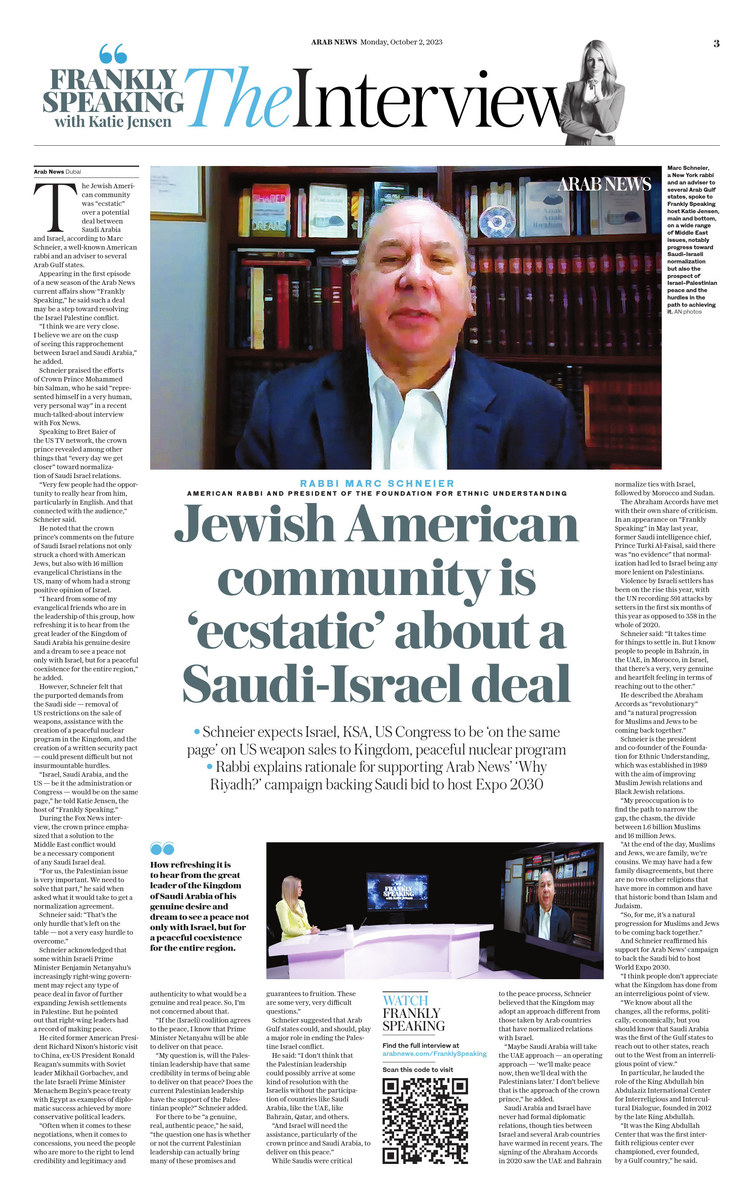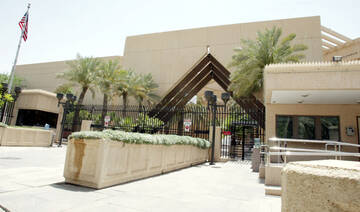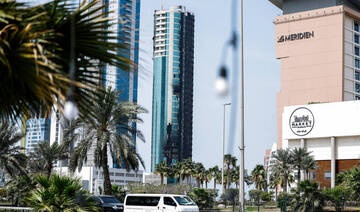DUBAI: The Jewish American community is “ecstatic” over a potential deal between Saudi Arabia and Israel, according to Marc Schneier, a well-known American rabbi and an adviser to several Arab Gulf states.
Appearing in the first episode of a new season of the Arab News current affairs show “Frankly Speaking,” he said such a deal may be a step toward resolving the Israel-Palestine conflict.
“I think we are very close. I believe we are on the cusp of seeing this rapprochement between Israel and Saudi Arabia,” he added.
Schneier praised the efforts of Crown Prince Mohammed bin Salman, who he said “represented himself in a very human, very personal way” in a recent much-talked-about interview with Fox News.
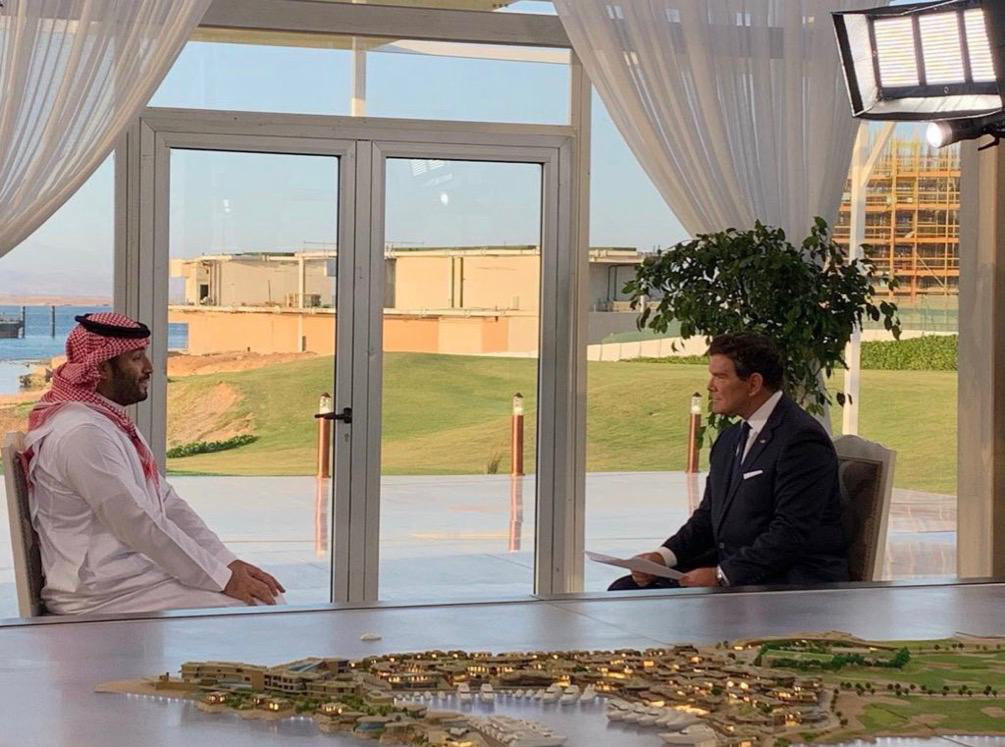
US broadcaster Fox News aired a two-day special last month on Saudi Arabia’s transformation, featuring an exclusive interview with Crown Prince Mohammed bin Salman. Fox News chief political correspondent Bret Baier was in Saudi Arabia for the program and the interview. (Supplied)
Speaking to Bret Baier of the US TV network, the crown prince revealed among other things that “every day we get closer” toward normalization of Saudi-Israel relations.
“Very few people had the opportunity to really hear from him, particularly in English. And that connected with the audience,” Schneier said.
He noted that the crown prince’s comments on the future of Saudi- Israel relations not only struck a chord with American Jews, but also with 16 million evangelical Christians in the US, many of whom had a strong positive opinion of Israel.
“I heard from some of my evangelical friends who are in the leadership of this group, how refreshing it is to hear from the great leader of the Kingdom of Saudi Arabia his genuine desire and a dream to see a peace not only with Israel, but for a peaceful coexistence for the entire region,” he added.
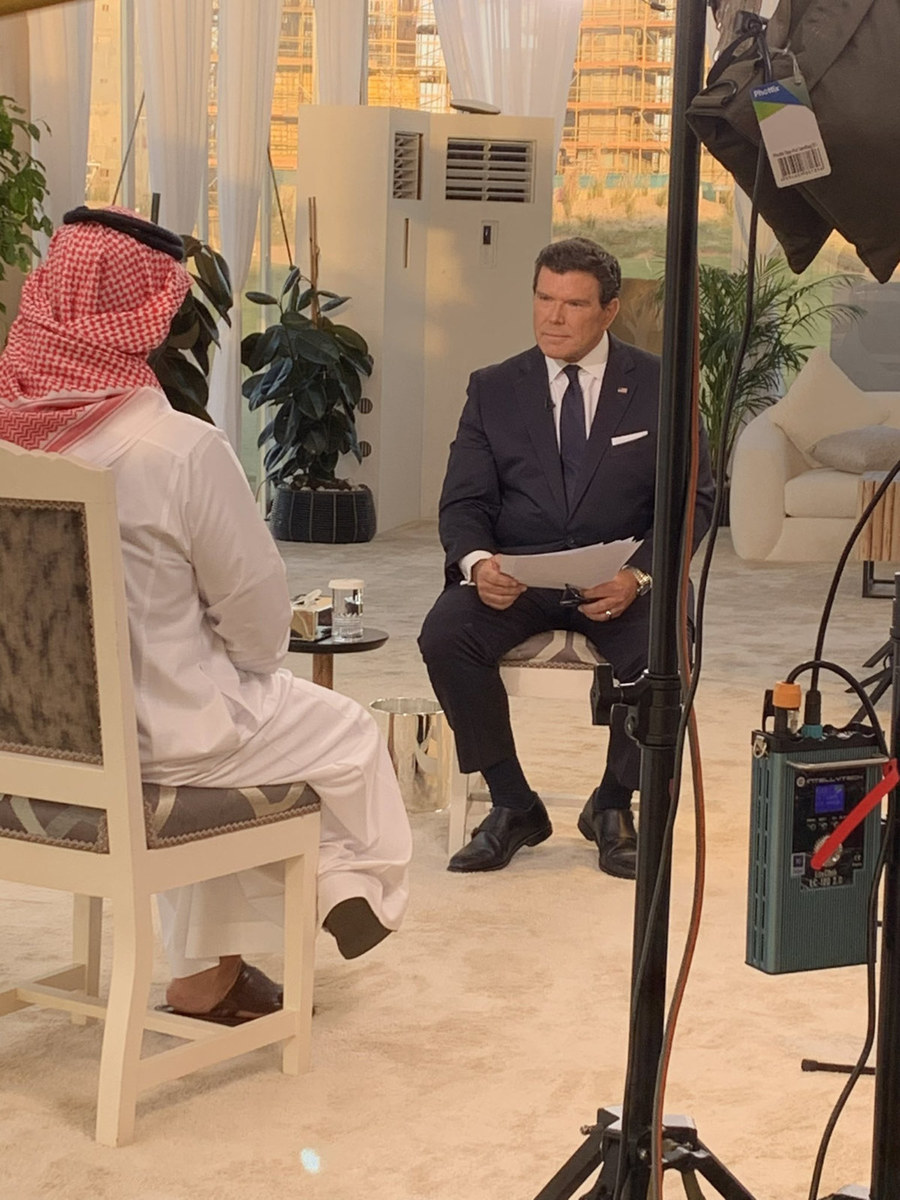
US broadcaster Fox News aired a two-day special last month on Saudi Arabia’s transformation, featuring an exclusive interview with Crown Prince Mohammed bin Salman. Fox News chief political correspondent Bret Baier was in Saudi Arabia for the program and the interview. (Supplied)
However, Schneier felt that the purported demands from the Saudi side — removal of US restrictions on the sale of weapons, assistance with the creation of a civilian nuclear program in the Kingdom, and the creation of a written security pact — could present difficult but not insurmountable hurdles.
“Israel, Saudi Arabia, and the US — be it the administration or Congress — would be on the same page,” he told Katie Jensen, the host of “Frankly Speaking.”
During the Fox News interview, the crown prince emphasized that a solution to the Middle East conflict would be a necessary component of any Saudi-Israel deal.
“For us, the Palestinian issue is very important. We need to solve that part,” he said when asked what it would take to get a normalization agreement.
Schneier said: “That’s the only hurdle that’s left on the table — not a very easy hurdle to overcome.”

Marc Schneier, a New York rabbi and an adviser to several Arab Gulf states, spoke to Frankly Speaking host Katie Jensen on a wide range of Middle East issues, notably progress toward Saudi-Israeli normalization but also the prospect of Israel-Palestinian peace and the hurdles in the path to achieving it. (AN photo)
He considered Jews not only in the US but around the world, including in Israel, as “being a bit naive and not appreciative of the importance of resolving this Israel-Palestinian conflict once and for all.”
Schneier acknowledged that some within Israeli Prime Minister Benjamin Netanyahu’s increasingly right-wing government may reject any type of peace deal in favor of further expanding Jewish settlements in Palestine. But he pointed out that right-wing leaders had a record of making peace.
He cited former American President Richard Nixon’s historic visit to China, ex-US President Ronald Reagan’s summits with Soviet leader Mikhail Gorbachev, and the late Israeli Prime Minister Menachem Begin’s peace treaty with Egypt as examples of diplomatic success achieved by more conservative political leaders.
“Often when it comes to these negotiations, when it comes to concessions, you need the people who are more to the right to lend credibility and legitimacy and authenticity to what would be a genuine and real peace. So, I’m not concerned about that.
“If the (Israeli) coalition agrees to the peace, I know that Prime Minister Netanyahu will be able to deliver on that peace.
“My question is, will the Palestinian leadership have that same credibility in terms of being able to deliver on that peace? Does the current Palestinian leadership have the support of the Palestinian people?” Schneier added.
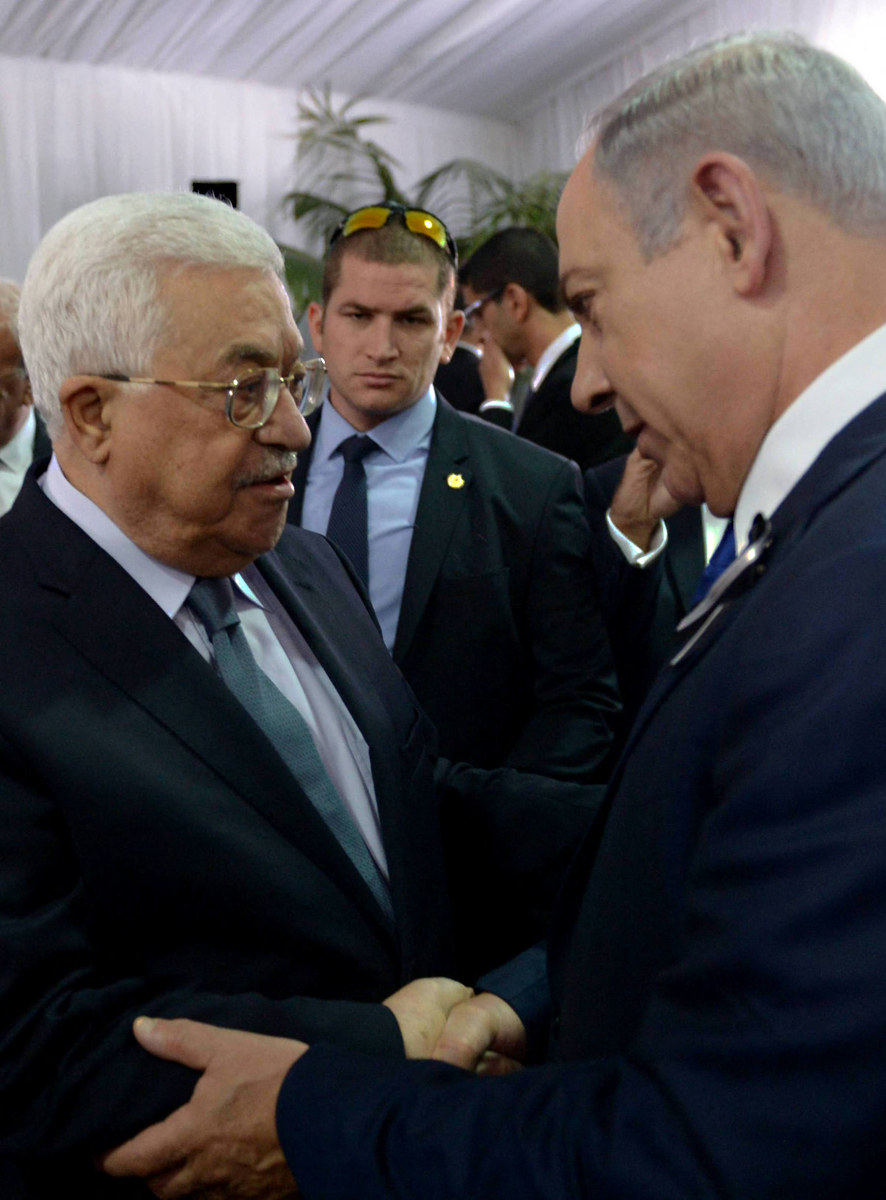
This photo taken on Sept. 30, 2016, shows Israeli Prime Minister Benjamin Netanyahu, right, shaking hands with Palestinian President Mahmud Abbas at the funeral of Israel's former president and prime minister Shimon Peres in Jerusalem. (AFP file photo)
For there to be “a genuine, real, authentic peace,” he said, “the question one has is whether or not the current Palestinian leadership can actually bring many of these promises and guarantees to fruition. These are some very, very difficult questions.”
Schneier suggested that Arab Gulf states could, and should, play a major role in ending the Israel-Palestine conflict.
He said: “I don’t think that the Palestinian leadership could possibly arrive at some kind of resolution with the Israelis without the participation of countries like Saudi Arabia, like the UAE, like Bahrain, Qatar, and others.
“And Israel will need the assistance, particularly of the crown prince and Saudi Arabia, to deliver on this peace.”
In mid-September, Israeli Foreign Minister Eli Cohen told Israel’s Army Radio that “there is certainly a likelihood” of details of a deal for forging Saudi Israel relations being “finalized” in the first quarter of 2024.
While Saudis were critical to the peace process, Schneier believed that the Kingdom may adopt an approach different from those taken by Arab countries that have normalized relations with Israel.
“Maybe Saudi Arabia will take the UAE approach — an operating approach — ‘we’ll make peace now, then we’ll deal with the Palestinians later.’ I don’t believe that is the approach of the crown prince,” he added.
Saudi Arabia and Israel have never had formal diplomatic relations, though ties between Israel and several Arab countries have warmed in recent years. The signing of the Abraham Accords in 2020 saw the UAE and Bahrain normalize ties with Israel, followed by Morocco and Sudan.
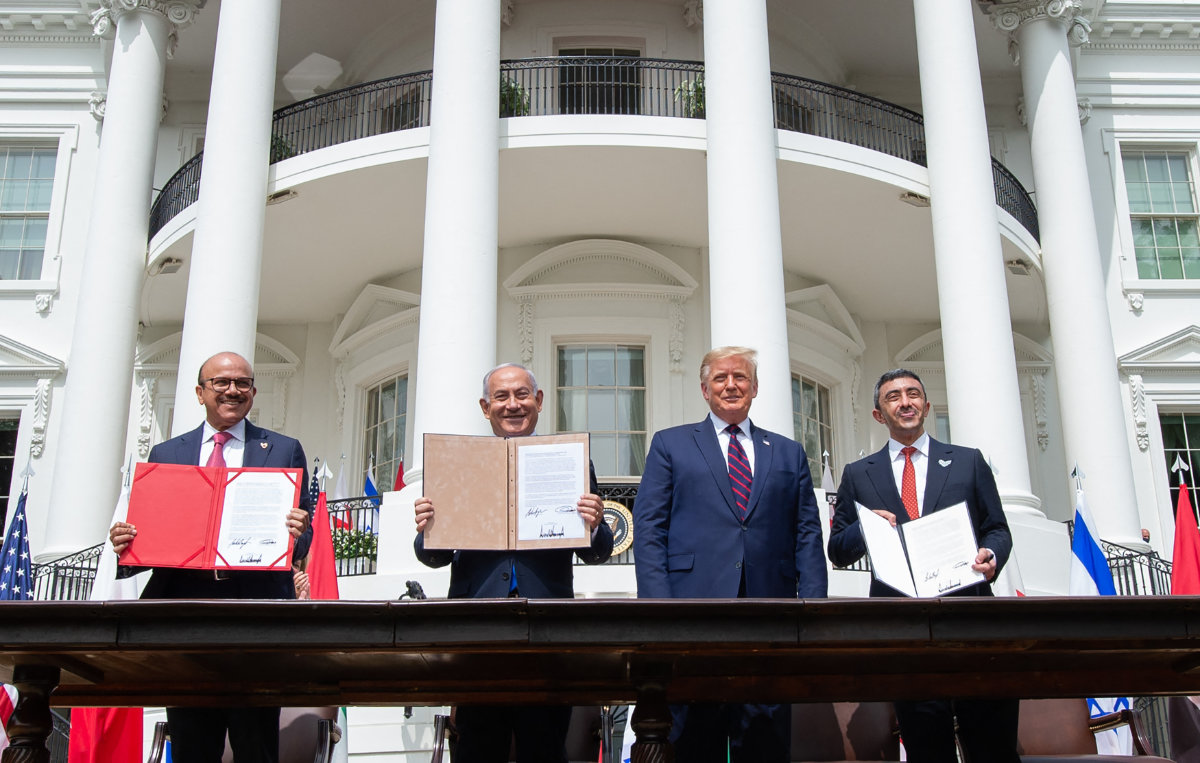
In this photo taken at the White House in Washington, D.C. on Sept. 15, 2020, then US President Donald Trump attends a photo session with Bahrain Foreign Minister Abdullatif Al-Zayani, left, Israeli PM Benjamin Netanyahu, second left, and UAE FM Abdullah bin Zayed Al-Nahyan, right, after participating in the signing of the Abraham Accords. (AFP file photo)
The Abraham Accords have met with their own share of criticism. In an appearance on “Frankly Speaking” in May last year, former Saudi intelligence chief, Prince Turki Al-Faisal, said there was “no evidence” that normalization had led to Israel being any more lenient on Palestinians.
Violence by Israeli settlers has been on the rise this year, with the UN recording 591 attacks by setters in the first six months of this year as opposed to 358 in the whole of 2020.
Schneier said: “It takes time for things to settle in. But I know people to people in Bahrain, in the UAE, in Morocco, in Israel, that there’s a very, very genuine and heartfelt feeling in terms of reaching out to the other.”
He described the Abraham Accords as “revolutionary” and “a natural progression for Muslims and Jews to be coming back together.”
Schneier has taken on an active role in Middle Eastern diplomacy, having facilitated a rapprochement between the presidents of Turkiye and Israel, Recep Tayyip Erdogan and Izaac Herzog, respectively.
“Before March 2022, the state of relations with Israel and Turkiye was one of conflict. Today is it one of great cooperation. So, yes, I’m very, very proud of the role that I played and looking forward to playing similar roles with other countries in terms of bringing the Muslim world closer to the state of Israel,” he added.
Schneier, a native New Yorker, is the president and co-founder of the Foundation for Ethnic Understanding, which was established in 1989 with the aim of improving Muslim-Jewish relations and Black-Jewish relations.
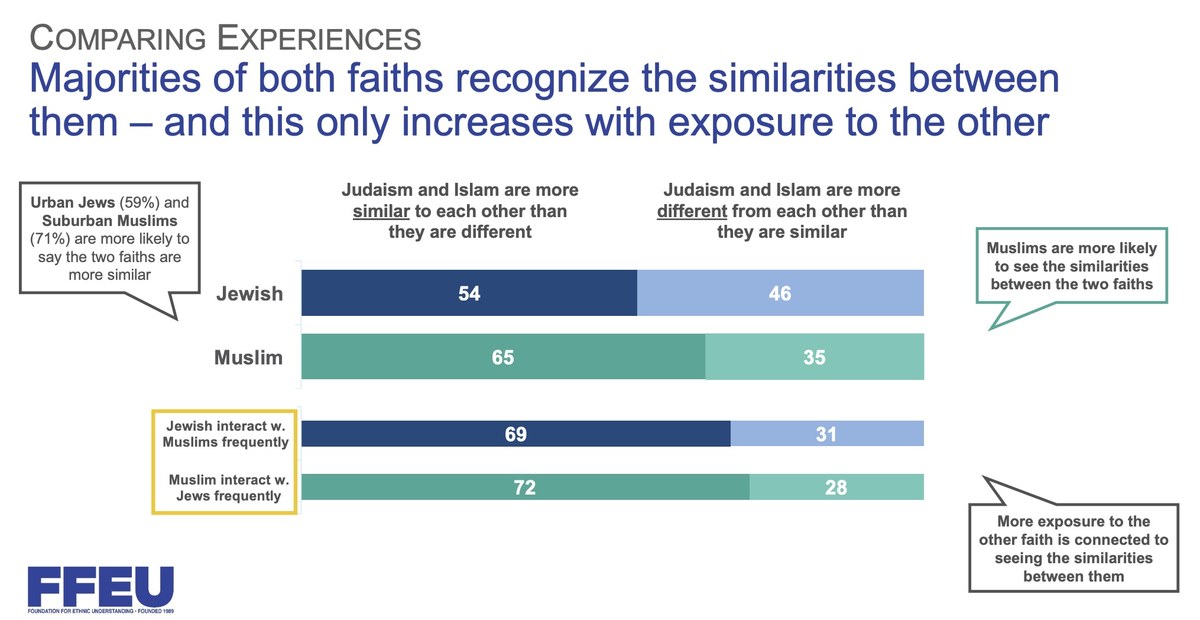
A poll conducted by the FFEU and PSB Research poll in 2018 showed majorities of Muslims and Jews recognize the similarities between the two faiths. (Courtesy: FFEU.org)
“My preoccupation is to find the path to narrow the gap, the chasm, the divide between 1.6 billion Muslims and 16 million Jews,” he said.
“At the end of the day, Muslims and Jews, we are family, we’re cousins. We may have had a few family disagreements, but there are no two other religions that have more in common and have that historic bond than Islam and Judaism.
“So, for me, it’s a natural progression for Muslims and Jews to be coming back together.”
And Schneier reaffirmed his support for Arab News’ campaign to back the Saudi bid to host World Expo 2030.
“I think people don’t appreciate what the Kingdom has done from an interreligious point of view.
“We know about all the changes, all the reforms, politically, economically, but you should know that Saudi Arabia was the first of the Gulf states to reach out to other states, reach out to the West from an interreligious point of view.”
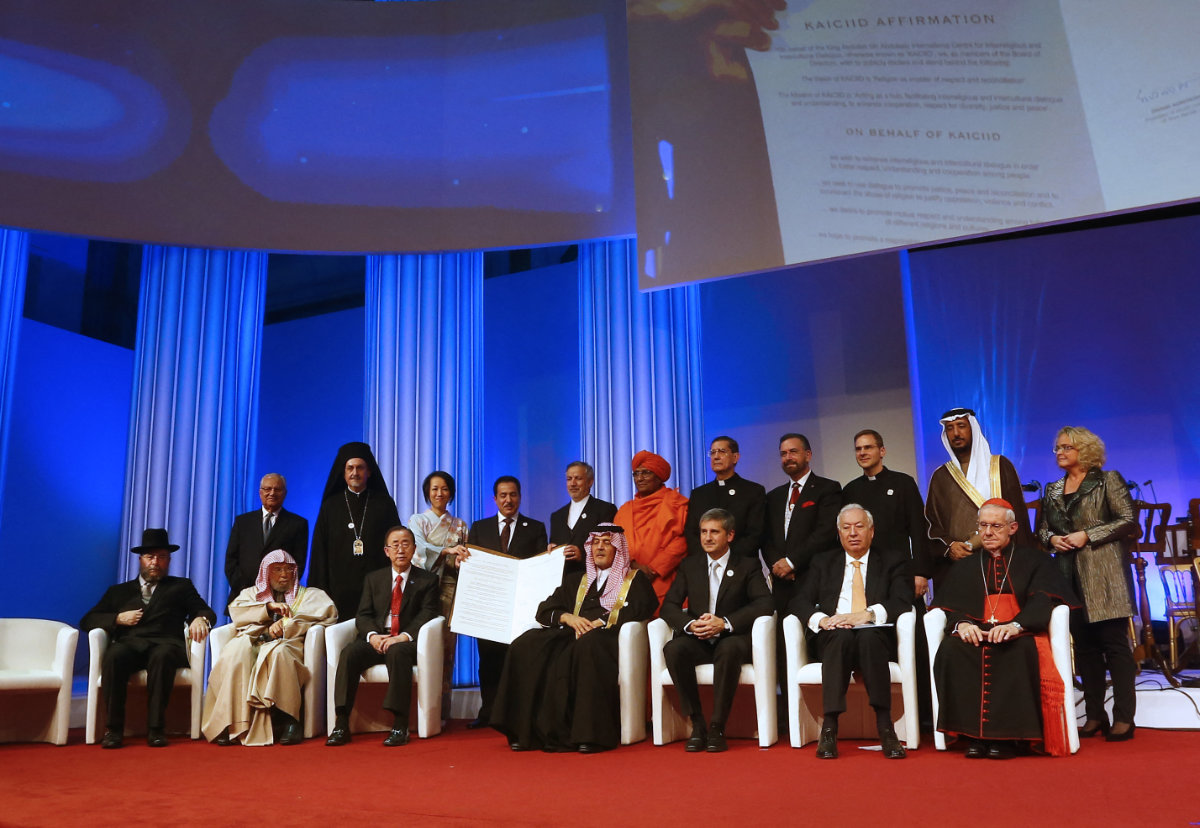
In this photo taken on Nov. 26, 2012, representatives of various religious groups, international organizations, and the United Nations attend a photo session during an inauguration ceremony of the KAICIID Center (King Abdullah Bin Abdulaziz International Centre for Interreligious and Intercultural Dialogue) at the Hofburg in Vienna, Austria. (AFP file photo)
In particular, he lauded the role of the King Abdullah bin Abdulaziz International Center for Interreligious and Intercultural Dialogue, founded in 2012 by the late King Abdullah.
“It was the King Abdullah Center that was the first interfaith religious center ever championed, ever founded, by a Gulf country,” he said.
Before agreeing to serve as the 2022 football World Cup’s interfaith adviser, Schneier called for direct flights between Tel Aviv and Doha and the provision of kosher food at the world’s largest sporting event to ensure “Israelis were made to feel welcome there.”
He added: “I call it my bagel diplomacy. We brought the first bagels ever to Doha, to Qatar.”
